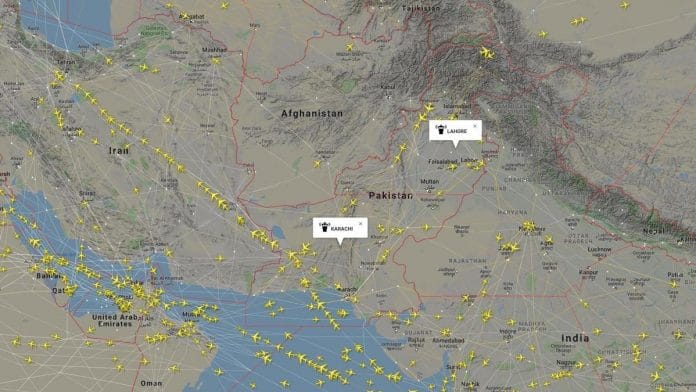New Delhi: Nearly four months after the Balakot air strike, Pakistan has finally opened its airspace for all international flights entering India towards its east, multiple sources told ThePrint.
“Pakistan has opened its airspace early Tuesday morning with immediate effect and has allowed all commercial airlines to fly over its territory while entering India,” a senior Pakistani official confirmed.
The move comes within two days of both sides having fruitful discussions on the Kartarpur corridor that took place at Wagah on 14 July in which both New Delhi and Islamabad covered several contentious issues.
A senior Indian government official said, “Pakistan had issued a NOTAM (notice to airmen) at 12:41 AM (India time) to all concerned authorities and consequently normal air traffic has been resumed between India and Pakistan as they were before February 27.”
The decision to open the airspace has come a week before when Pakistan Prime Minister Imran Khan is scheduled to meet US President Donald Trump in Washington DC on 22 July.
Also read: Pakistan’s changed behaviour post-Balakot isn’t permanent. But India can make it one
The ban after Balakot strikes
Pakistan had sealed its airspace for all international flights crossing its airspace to enter India from its east on 27 February, a day after the Indian Air Force (IAF) attacked terror group Jaish-e-Mohammed’s training camps in the Balakot region of Khyber Pakhtunkhwa.
On 9 March, Pakistan opened one eastbound and one westbound transiting airway through Pakistani airspace between Muscat and Mumbai. However, reciprocal connectivity was not allowed.
Pakistan did allow former External Affairs Minister Sushma Swaraj’s flight to go via its airspace when she had to travel to Bishkek, Kyrgyzstan to attend the foreign ministers meet of the Shanghai Cooperation Organisation (SCO) on 21 May.
Similarly in June, Pakistani authorities had given permission to Prime Minister Narendra Modi’s flight to fly over its airspace when he had to attend the SCO Summit. But the prime minister chose to not to fly over Pakistan’s airspace and flew via Oman, Iran and Central Asian countries to enter the Kyrgyz capital.
Indian airlines lost almost Rs 550 crore until 20 June due to Pakistan airspace closure. Separately, India’s national carrier Air India suffered a loss of Rs 491 crore until 2 July, Union Civil Aviation Minister Hardeep Singh Puri said in a reply to a question in Rajya Sabha.
Also read: Modi isn’t about to change India into national security state like Pakistan & bankrupt it







Welcome decision, which will save time, ATF and environmental harm. Pakistan is an obdurate problem. There are no bold, innovative, out of the box solutions. Nor were previous governments lacking in sincerity and intent. So the consequences of each new step should be carefully thought through.